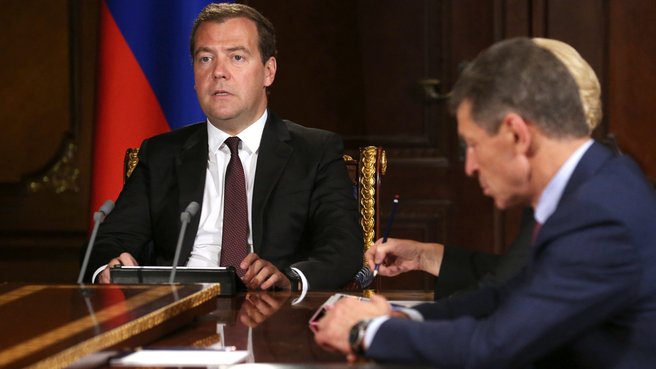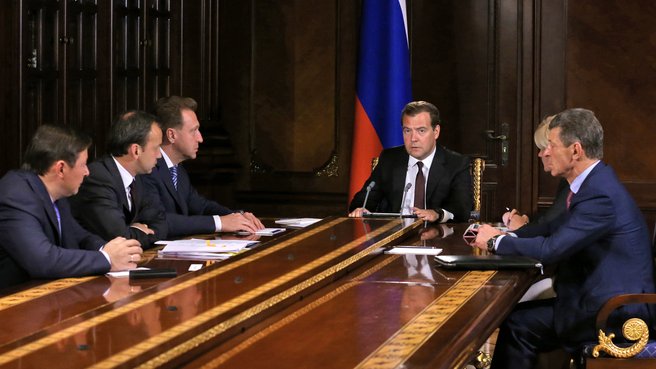Agenda: LNG production; limits on state purchases of some foreign made equipment.
Dmitry Medvedev’s opening remarks
Report by Arkady Dvorkovich on limiting the state purchase of some foreign made equipment
Transcript:
Dmitry Medvedev: A few words about power generating. You know that liquefied natural gas is a very promising area of energy production globally. All countries are working on this issue, and Russia is no exception in this sense. Although Russia has huge reserves of natural gas and is one of the largest exporters of gas via pipelines, so called pipeline gas, it should not overlook other development opportunities in gas-fuelled power generation, such as gas liquefaction and LNG export under contracts.
Dmitry Medvedev: "It’s the Government’s responsibility to approve a list of companies with the exclusive right to export LNG. Under the current criteria for specifying these companies, this exclusive right has been granted to four companies: OJSC Gazprom, its subsidiary Gazprom Export, OJSC Rosneft and OJSC Yamal LNG."
We are implementing a number of large projects in this area. It’s the Government’s responsibility to approve a list of companies with the exclusive right to export LNG. I have signed a directive to this effect. Under the current criteria for specifying these companies, this exclusive right has been granted to four companies: OJSC Gazprom, its subsidiary Gazprom Export, OJSC Rosneft and OJSC Yamal LNG. Export licences will be issued by the Energy Ministry. I hope this will help us deal with current power generation challenges.
I have also signed documents on support for Russian business enterprises following our accession to the WTO. Considering current developments, we should take more advantage of the system of state purchases. The Government makes large purchases, and huge funds are allocated from the budget for the purchase of goods and services. It would therefore be logical to allocate these funds to Russian companies rather than foreign companies, but only if Russian companies produce competitive goods in terms of quality and price. This will create additional impetus for the technological upgrade of our industries, including mechanical engineering, and will help replace imports with domestic products.
Dmitry Medvedev: "We have drafted a resolution that bans the state and municipal purchase of certain types of foreign made equipment and vehicles, notably such conspicuous issues as the purchase of vehicles for officials, as well as public transport, special equipment used by emergency services, public organisations, as well as utility, construction and other types of equipment."
We have drafted a resolution that bans the state and municipal purchase of certain types of foreign made equipment and vehicles, notably such conspicuous issues as the purchase of vehicles for officials, as well as public transport, special equipment used by emergency services, public organisations, as well as utility, construction and other types of equipment.
Of course, this document does not provide for terminating cooperation with foreign companies, which would have been unreasonable. On the contrary, it encourages cooperation between foreign firms and Russian producers, including by localising the production of a number of technological products.
I hope this will help maintain the necessary balance on the market and ultimately satisfy the demand for these services.
I signed this document. Mr Dvorkovich (Arkady Dvorkovich), you coordinated this project. Please tell us about its uses and application criteria.
Arkady Dvorkovich: Mr Prime Minister, colleagues. The main issues have been outlined. It’s true that the document bans the purchase of foreign made equipment, primarily vehicles, for state and municipal purposes. With regard to vehicles, the ban concerns government agencies and publicly financed institutions. The term “foreign made” – and the ban concerns only foreign made equipment – will define equipment that is made outside of Russia.
Dmitry Medvedev: In other words, you don’t mean foreign brands designed outside of Russia, but equipment that is built in foreign countries.
Arkady Dvorkovich: Yes, foreign countries.
Dmitry Medvedev: The brands that are assembled in Russia will be considered Russian made equipment.
Arkady Dvorkovich: Yes, for the purposes of this resolution, the brands that are assembled in Russia, and that include the agreed upon level of domestic content, will be considered Russian made equipment.
Dmitry Medvedev: And what level is that?
Arkady Dvorkovich: It will gradually increase. The current level is between 30 and 40 percent for different enterprises, but it will increase to 60-70 percent by 2018. If the companies comply with this schedule, they will be able to sell their products under state and municipal procurement contracts, and not just on the open market with the usual commercial conditions.
Arkady Dvorkovich: "When compiling the list of this equipment, we analysed available production facilities in Russia and their cooperation plans with foreign companies. We have concluded confidently that this equipment can be produced in Russia with acceptable, competitive quality and at prices that would be commensurate with the competition’s pricing."
You also mentioned utility, construction and other special equipment. The same criteria and conditions will be applied in these cases. When compiling the list of this equipment, we analysed available production facilities in Russia and their cooperation plans with foreign companies. We have concluded confidently that this equipment can be produced in Russia with acceptable, competitive quality and at prices that would be commensurate with the competition’s pricing.
There will be no price hikes, no infringement on competition terms. We have coordinated this project with the antimonopoly service, which is always very cautious about restrictive business practices. We are confident that we can make further use of domestic industries and motivate them to upgrade their technical standards by giving them these preferences.
Let me say that two more similar resolutions are being drafted. The first will concern textiles. This is still in the planning stages, but the basic list has been identified without any major objections. I think we’ll be able to forward it to you for signing in two or three weeks. This resolution will provide a powerful development impetus for the Russian textile industry. Our companies are already working well in some areas, but there’s more they can do.
The next document is more sensitive and complex, because it concerns medical equipment. We’ll need more time to coordinate the list of equipment that should not be bought from foreign producers.
Dmitry Medvedev: You’ve said this will take… Indeed, medical equipment is the most sensitive area, because people’s lives and health depend on it. Our medical industry has improved a lot; the production standards are a far cry from 10 or 15 years ago. Large amounts of modern medical equipment are now made in Russia, as we have seen at various exhibitions. But this doesn’t mean that we should stop importing equipment that is not produced in Russia. It is a very delicate issue, which we should thoroughly consider before taking decisions.
Dmitry Medvedev: "Our medical industry has improved a lot; the production standards are a far cry from 10 or 15 years ago. Large amounts of modern medical equipment are now made in Russia, as we have seen at various exhibitions."
As for antitrust legislation, you mentioned the stance of the Federal Antimonopoly Service (FAS). It should continue monitoring the situation, because some people see the adoption of such documents as grounds for relaxing, thinking that their products will be bought regardless of the quality. We should integrate a system under which we stop buying inferior quality or overpriced equipment, even if this is domestically produced equipment. We need to monitor this situation.
Arkady Dvorkovich: These documents provide for creating such a mechanism, and we’ll strictly apply it.
Dmitry Medvedev: Please do.
<…>











